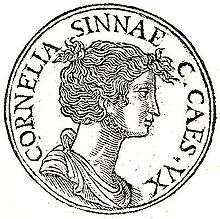Cornelia (wife of Caesar)

| Cornelia | |
|---|---|
| Born |
97 B.C Rome |
| Known for | The first wife of Julius Caesar |
Cornelia, sometimes known as Cornelia Minor,[lower-roman 1] (c. 97 BC – 69 BC[1]), daughter of Lucius Cornelius Cinna (one of the great leaders of the Marian party), and a sister to suffect consul Lucius Cornelius Cinna, was married to Gaius Julius Caesar, who would become one of Rome's dictators. Cinna's political party was called the Populares, and his union with Cornelia identified Caesar with this faction.[2]
Caesar and Cornelia married in 84 BC.[3]
When Lucius Cornelius Sulla commanded Caesar to divorce Cornelia, the young husband refused to do so and chose rather to be deprived of her fortune and to be proscribed himself. Cornelia bore him his daughter Julia, in c. 76 BC.[4]
Cornelia was the matron of Caesar's household in their home at the Subura in Rome for sixteen years. She died in 69 BC, during Caesar's quaestorship, and left him a daughter. Caesar delivered an oration in praise of her from the Rostra.[5]
Footnotes
- ↑ As with most Roman women, Cornelia was known chiefly by her nomen gentilicium, which was sufficient to distinguish her from every other member of her family except her elder sister; to distinguish the two, the elder was called Cornelia Major and the younger Cornelia Minor. If further distinction were needed, she could be described using filiation, as Cinnae filia, "Cinna's daughter", or Caesaris uxor, "Caesar's wife". Abbreviations of this style have led to the misunderstanding that her name was Cornelia Cinnae or Cornelia Caesaris. She could also be known by the diminutive Cinilla, "little (girl) Cinna", but this was not not part of her legal name.
References
- ↑ Matthias Gelzer, Caesar, Politician and Statesman, (translated by Peter Needham), Oxford, 1968; Thomas Robert Shannon Broughton, Magistrates of the Roman Republic, vol. 2, 132, New York, (1951-1986). Gelzer quotes Broughton to assert that Caesar was quaestor in 69 BC. Gelzer explains that Caesar, after becoming quaestor, delivered an oration in praise of his aunt Julia. Shortly after this event, Cornelia died too.
- ↑ The Gallic War, Julius Caesar, The Ginn Company, 1886, pg. 16.
- ↑ Adrian Goldsworthy, Caesar, 2006, pg. 58. Despite Monroe E Deutsch, The Women of Caesar's Family, The Classical Journal, Volume 13, 1918, pg. 505, it is unlikely that this took place after the death of Cornelia's father Cinna in 84 BC.
- ↑ Guy Edward Farquhar Chilver , Robin J. Seager " Iulia (2)" The Oxford Classical Dictionary. Ed. Simon Hornblower and Anthony Spawforth. Oxford University Press 2009. Oxford Reference Online. Oxford University Press. <http://www.oxfordreference.com/views/ENTRY.html?subview=Main&entry=t111.e3368>
- ↑ The ancient sources on Cornelia are Plutarch, Caesar, 1, 5; Suetonius, Life of Julius Caesar, 1, 5, 6; Velleius Paterculus, ii. 41.
This entry incorporates public domain text originally from:
- William Smith (ed.), Dictionary of Greek and Roman Biography and Mythology, 1870.